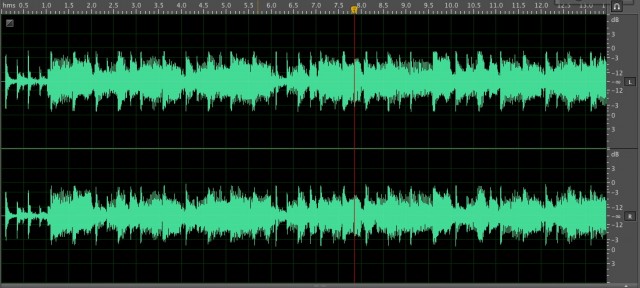
I started to title this post “Don’t Put Copyrighted Music in Your Videos” but that doesn’t really fit. If someone else created/performed it, then chances are that there’s a valid copyright to it and you need to either: (1) pony up for a license fee, or (2) think twice about using it in your videos.
While I am a lawyer, I am not your lawyer and this is an editorial commentary on newsworthy issues rather than legal advice. Remember that one too – unless you’re paying a lawyer, you aren’t really getting legal advice, and what you are getting on blogs, forums and Twitter is worth just what you paid for it. Seriously, remember that the next time you want to rely on someone’s advice on a forum. The judge won’t be too keen on a printout of a blog post when you hand it to him as “evidence.”
When I read this story about a wedding photographer’s unauthorized use of a Coldplay song in a wedding client’s video, I thought about the ton of videos that I see from photographers/cinematographers on Vimeo that feature unlicensed music. Some claim fair use because it’s “personal” work and some just do so out of ignorance.
And, I can’t even begin to count the number of child and family photographers who have websites that play “Sweet Pea” in the background.
If you didn’t read the story that I linked to above, the takeaway is that the photographer settled for an undisclosed amount in order to avoid a lawsuit and the video was taken down. Lots of bad things there . . . from money out of the pocket, to uncomfortable situations with clients.
There’s also a lot of speculation in the article among photographers about whether or not using unlicensed music on wedding DVDs is appropriate. It’s not.
If you’re shooting something for a client and going to deliver a video, any music accompanying that video should be appropriately licensed. Chances are that Coldplay isn’t going to license that music for a reasonable fee – unless your client is a high-end commercial client (in which case, you already know this and “reasonable” is a relative term for the client at hand).
I’ll go a step further to suggest that any video you make in a professional capacity (whether it’s “personal” work for your portfolio/demo reel, or a project that will air on a national broadcast) should only feature licensed music.
So where do you get quality music that is licensed for commercial use?
There are a ton of music licensing resources out there; however, the one I use most frequently is SmartSound.
This is my go-to resource when I need a music bed for any video. Just about any type of song or beat, I can find on here. SmartSound has a great piece of software called Sonicfire Pro, which lets you customize all sorts of things in each track – from the length, to the intensity or presence of individual instruments.
Individual songs range from around $20-$35 and you can buy album packs at serious bulk discounts. If you’re doing wedding videos, pick up a couple of album packs and you’ll have a ton of options to choose from. Buy a song license one time and you can use it over and over again with new customizations each time.
The license from Smart Sound gives you royalty-free rights (which means you don’t have to pay royalties on the songs after you pay the one-time license fee) for just about any use of the song. The only real exceptions come when you are distributing thousands of copies of your production, which should only really reach the feature film folks who have a serious distribution.
As content creators, this is kind of a big deal. What would you do if someone used your videos or images to advertise their brand or promote their professional services?
While the music industry is easy to hate thanks to the RIAA’s loving treatment in recent years, the same copyright laws that protect photographers apply to music.
Vimeo is starting to take this music licensing business serious and now has a music store for purchasing music to use in videos online. YouTube has a “replace audio” feature for stripping out questionable music and choosing music to match your videos and keep you legally safe.
Other online resources for royalty-free music include Video Helper, Audio Jungle, iStock Audio, Animoto (w/ photo/video customizations) and many others. I’m familiar with these; however, I generally use SmartSound in combination with Sonicfire Pro when I need music to put in a video.
There are other resources that I came across while searching for music licensing options that claim to have a catalog of popular music available at reasonable licensing rates. I’m not familiar with any of these; however, I would encourage you to look closely at usage restrictions (such as online hosting and other uses when the video is out of your hands) before you feel free to use a song in their library at will.
Where do you get music for your videos?


You could also try http://artsocket.com/music -the author generally gives it for free. Just email d (at) artsocket.com with your choice.
you know as a photographer one does not want ones copyrighted images out in the wild w/o permission the same goes for any musician/writer/performer. and all along i that this was common knowledge.
There are other alternatives as well. Many musicians as well as photographers are using new business models based on Creative Commons type licenses. In some cases you can use their works commercially at no cost or at a lower cost than traditionally licensed works. Non-commercial use is almost always at no cost. Artists can select from a variety of CC licenses, so as with any music, you need to be sure to follow the license requirements. Here’s a good place to start:
http://creativecommons.org/music-communities
So if someone asks me to record their wedding and hands me a CD that they purchased to use for background music for the video, is that OK or not? Let’s assume I’m being paid something for doing the work.
Buying a CD doesn’t give a client anymore rights to use the music on the CD than if you bought it. Of course, because they purchased it, they can listen to that CD for home/personal use; however, using the copyrighted content on that CD in any other manner runs the risk of violating copyright law. In this case, they would be commissioning a derivative work created by you, which is an exclusive right of the copyright holder under 17 USC 106. Additionally, the duplication of the track(s) used would also violate the copyright holder’s exclusive right to reproduce the song(s) under section 106. Fair Use provides certain exceptions to section 106; however, I do not believe those apply in cases like we are discussing here. As a result, I think the circumstance you describe is “not OK.”
Thanks for the reply, Eric. This is a helpful post.
does that mean l have to compose my own music?
If you are musician (and you are good), why wouldn’t you want to? But if you aren’t, maybe not a good idea. Just buy licenses in the sources mentioned above, find creative commons music or contact me – I’ve got 100+ tracks I might be willing to give away for free.
Hi Erci, thanks for this great article! Do you know Audiobello? It´s a new search engine for royalty free music. http://audiobello.com
Great article. I recommend filmtrax.com. Music from indie artists for a fair price.
Yes, I have worked with http;//filmtrax.com. What a great deal!
Very useful post :-) A new one I’ve been using is https://www.zeilermedia.com/. Their music seems a bit more original than some libraries..